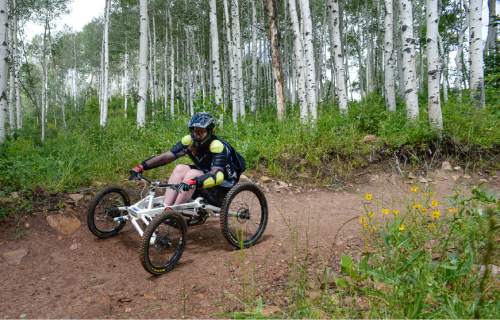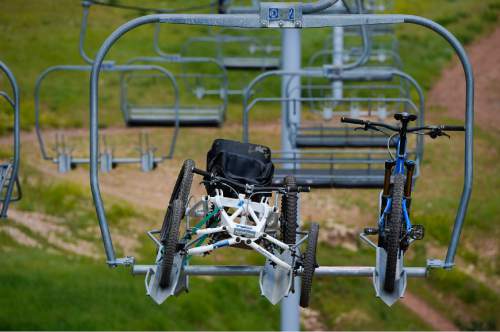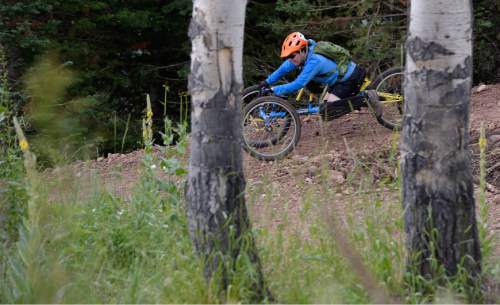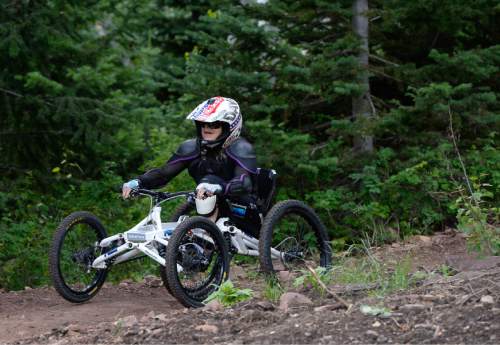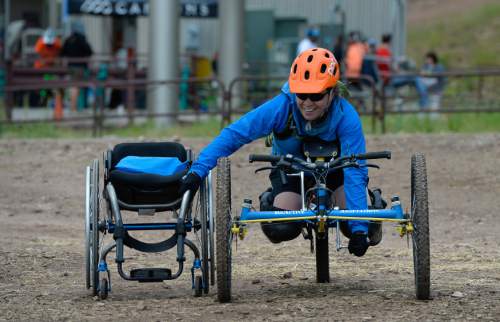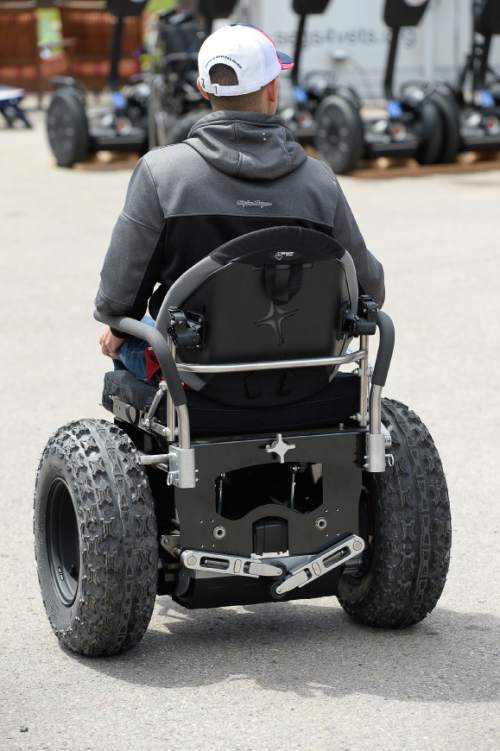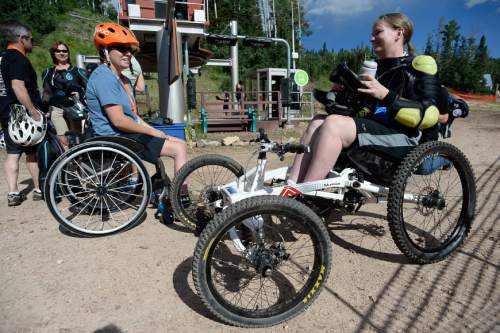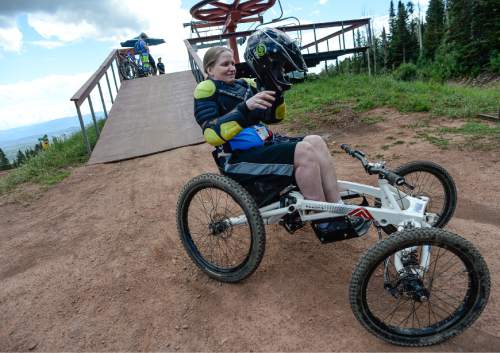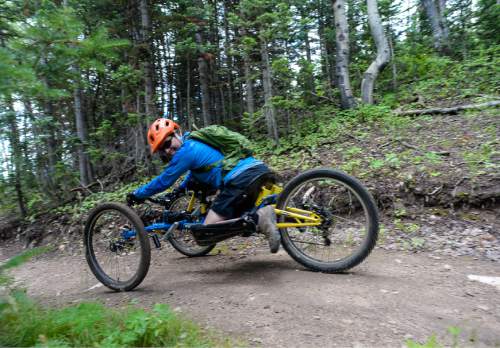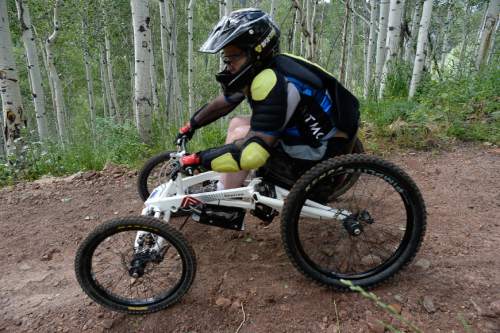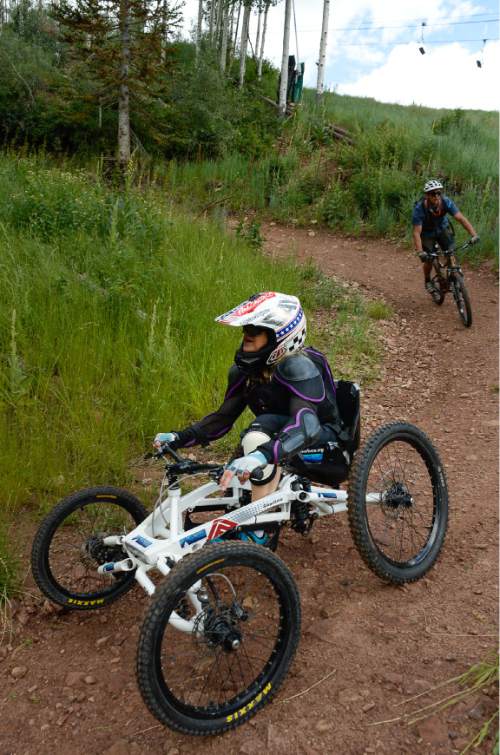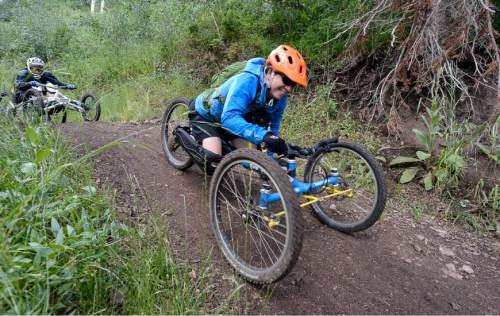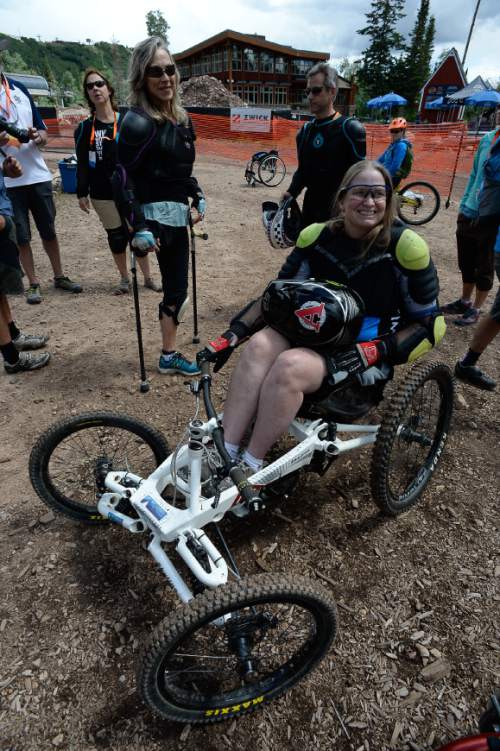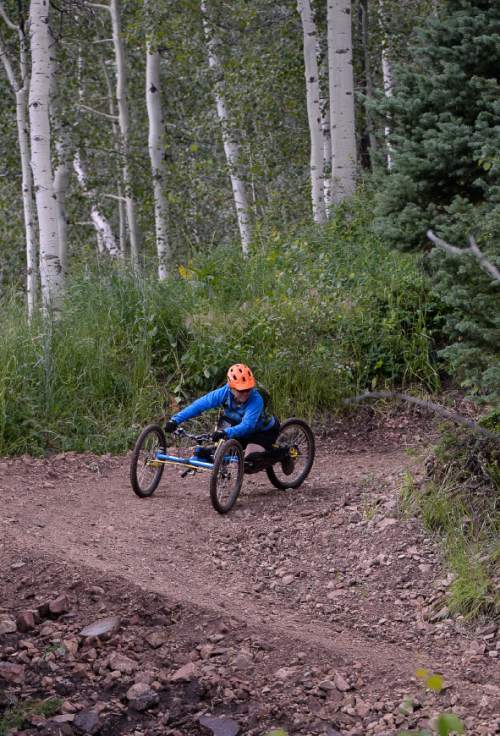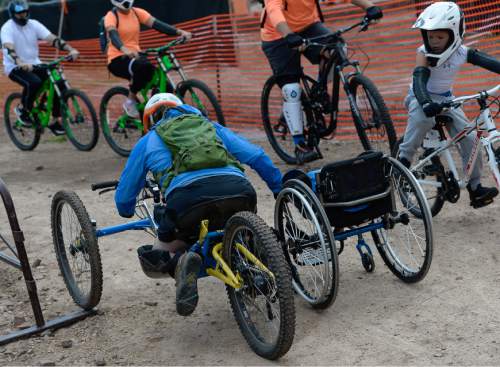Francisco Kjolseth | The Salt Lake Tribune
Stephanie Boyles, 47, of Denver Co., who once raced mountain bikes in the Expert catego
Francisco Kjolseth | The Salt Lake Tribune
A downhill 4-Cross mountain bike rides alongside a regular bike as athletes get ready t
Francisco Kjolseth | The Salt Lake Tribune
Sylvie Fadrhonc, who lost mobility of her legs in a car accident 7-years ago cruises do
Francisco Kjolseth | The Salt Lake Tribune
Sarah Doherty of Vancouver Canada tries out a new sport as she cruises down the mountai
Francisco Kjolseth | The Salt Lake Tribune
Sylvie Fadrhonc, who lost mobility of her legs in a car accident 7-years ago, manages h
Francisco Kjolseth | The Salt Lake Tribune
The No Barriers Summit sponsored by the National Ability Center showcases new technolog
Francisco Kjolseth | The Salt Lake Tribune
Sylvie Fadrhonc, left, meets Stephanie Boyles as they get ready to participate in the D
Francisco Kjolseth | The Salt Lake Tribune
Stephanie Boyles, 47, of Denver CO, who used to race mountain bikes in the Expert categ
Francisco Kjolseth | The Salt Lake Tribune
Sylvie Fadrhonc, who lost mobility of her legs in a car accident 7-years ago, cruises d
Francisco Kjolseth | The Salt Lake Tribune
Stephanie Boyles, 47, of Denver CO, who used to race mountain bikes in the Expert categ
Francisco Kjolseth | The Salt Lake Tribune
Sarah Doherty of Vancouver Canada, who lost a leg in 42-years ago when she was hit by a
Francisco Kjolseth | The Salt Lake Tribune
Sylvie Fadrhonc, who lost mobility of her legs in a car accident 7-years ago, cruises d
Francisco Kjolseth | The Salt Lake Tribune
Stephanie Boyles, 47, right, of Denver CO, who used to race mountain bikes in the Exper
Francisco Kjolseth | The Salt Lake Tribune
Sylvie Fadrhonc, who lost mobility of her legs in a car accident 7-years ago rounds a c
Francisco Kjolseth | The Salt Lake Tribune
Sylvie Fadrhonc, who lost mobility of her legs in a car accident 7-years ago, manages h
Francisco Kjolseth | The Salt Lake Tribune
Stephanie Boyles, 47, of Denver Co., who once raced mountain bikes in the Expert category before experiencing a type of stroke in her spine 7-years ago, thrills at getting one of the few chances to race in the Downhill 4-Cross Mountain Biking clinic at the Canyon's resort on Friday. Sponsored by the National Ability Center, the No Barriers Summit in Park City is expected to draw 1,000 adaptive sports athletes and artists to participated in a number of different clinics.
Francisco Kjolseth | The Salt Lake Tribune
A downhill 4-Cross mountain bike rides alongside a regular bike as athletes get ready to participate in the No Barriers Summit in Park City. Sponsored by the National Ability Center the three day events expects to draw 1,000 adaptive sports athletes and artists.
Francisco Kjolseth | The Salt Lake Tribune
Sylvie Fadrhonc, who lost mobility of her legs in a car accident 7-years ago cruises down the hill on her hand cycle as she acts as a volunteer for the Downhill 4-Cross Mountain Biking clinic at the Canyon's resort on Friday, July 10, 2015. The No Barriers Summit sponsored by the National Ability Center drew hundreds of athletes and artists to participated in a number of different clinics.
Francisco Kjolseth | The Salt Lake Tribune
Sarah Doherty of Vancouver Canada tries out a new sport as she cruises down the mountain in the Downhill 4-Cross Mountain Biking clinic at the Canyon's resort on Friday, July 10, 2015. Sponsored by the National Ability Center, the No Barriers Summit in Park City is expected to draw 1,000 adaptive sports athletes and artists to participated in a number of different clinics.
Francisco Kjolseth | The Salt Lake Tribune
Sylvie Fadrhonc, who lost mobility of her legs in a car accident 7-years ago, manages her hand cycle and wheelchair after volunteering for the Downhill 4-Cross Mountain Biking clinic at the Canyon's resort on Friday, July 10, 2015. The No Barriers Summit sponsored by the National Ability Center drew hundreds of athletes and artists to participated in a number of different clinics.
Francisco Kjolseth | The Salt Lake Tribune
The No Barriers Summit sponsored by the National Ability Center showcases new technology for those needing a wheelchair with an option similar to the Segway but in chair format.
Francisco Kjolseth | The Salt Lake Tribune
Sylvie Fadrhonc, left, meets Stephanie Boyles as they get ready to participate in the Downhill 4-Cross Mountain Biking clinic at the Canyon's resort on Friday, July 10, 2015. The No Barriers Summit sponsored by the National Ability Center drew hundreds of athletes and artists to participated in a number of different clinics.
Francisco Kjolseth | The Salt Lake Tribune
Stephanie Boyles, 47, of Denver CO, who used to race mountain bikes in the Expert category before experiencing a type of stroke in her spine 7-years ago, thrills at getting one of the few chances to race in the Downhill 4-Cross Mountain Biking clinic at the Canyon's resort on Friday, July 10, 2015. Sponsored by the National Ability Center, the No Barriers Summit in Park City is expected to draw 1,000 adaptive sports athletes and artists to participated in a number of different clinics.
Francisco Kjolseth | The Salt Lake Tribune
Sylvie Fadrhonc, who lost mobility of her legs in a car accident 7-years ago, cruises down the mountain on her custom hand cycle bike while volunteering for the Downhill 4-Cross Mountain Biking clinic at the Canyon's resort on Friday, July 10, 2015. The No Barriers Summit sponsored by the National Ability Center drew hundreds of athletes and artists to participated in a number of different clinics.
Francisco Kjolseth | The Salt Lake Tribune
Stephanie Boyles, 47, of Denver CO, who used to race mountain bikes in the Expert category before experiencing a type of stroke in her spine 7-years ago, thrills at getting one of the few chances to race in the Downhill 4-Cross Mountain Biking clinic at the Canyon's resort on Friday, July 10, 2015. Sponsored by the National Ability Center, the No Barriers Summit in Park City is expected to draw 1,000 adaptive sports athletes and artists to participated in a number of different clinics.
Francisco Kjolseth | The Salt Lake Tribune
Sarah Doherty of Vancouver Canada, who lost a leg in 42-years ago when she was hit by a drunk driver, experiences for the first time the Downhill 4-Cross Mountain Biking clinic at the Canyon's resort on Friday, July 10, 2015. Sponsored by the National Ability Center, the No Barriers Summit in Park City is expected to draw 1,000 adaptive sports athletes and artists to participated in a number of different clinics.
Francisco Kjolseth | The Salt Lake Tribune
Sylvie Fadrhonc, who lost mobility of her legs in a car accident 7-years ago, cruises down the mountain on her custom hand cycle bike while volunteering for the Downhill 4-Cross Mountain Biking clinic at the Canyon's resort on Friday. The No Barriers Summit sponsored by the National Ability Center drew hundreds of athletes and artists to participated in a number of different clinics.
Francisco Kjolseth | The Salt Lake Tribune
Stephanie Boyles, 47, right, of Denver CO, who used to race mountain bikes in the Expert category before experiencing a type of stroke in her spine 7-years ago, is all smiles after racing down the mountain in the Downhill 4-Cross Mountain Biking clinic at the Canyon's resort on Friday, July 10, 2015. At left, Sarah Doherty who lost her leg when she was hit by a drunk driver 42-year ago, shares Boyles elation after coming down the mountain. Sponsored by the National Ability Center, the No Barriers Summit in Park City is expected to draw 1,000 adaptive sports athletes and artists to participated in a number of different clinics.
Francisco Kjolseth | The Salt Lake Tribune
Sylvie Fadrhonc, who lost mobility of her legs in a car accident 7-years ago rounds a corner on her special hand cycle as she acts as a volunteer for the Downhill 4-Cross Mountain Biking clinic at the Canyon's resort on Friday, July 10, 2015. The No Barriers Summit sponsored by the National Ability Center drew hundreds of athletes and artists to participated in a number of different clinics.
Francisco Kjolseth | The Salt Lake Tribune
Sylvie Fadrhonc, who lost mobility of her legs in a car accident 7-years ago, manages her hand cycle and wheelchair after volunteering for the Downhill 4-Cross Mountain Biking clinic at the Canyon's resort on Friday, July 10, 2015. The No Barriers Summit sponsored by the National Ability Center drew hundreds of athletes and artists to participated in a number of different clinics.


